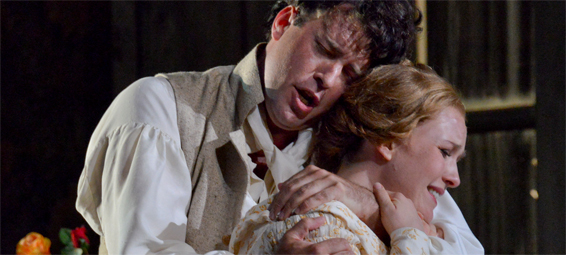There’s been quite a bit of water under the bridge musically in the quarter of a century since the Dallas Opera presented the premiere of Dominick Argento’s The Aspern Papers in 1988. Composers, the musical establishment, and audiences were then only slowly becoming comfortable with the idea that new music need be neither distressingly dissonant nor minimalist. It was works like The Aspern Papers—which might reasonably be described as neo-versimo—that brought on a full-blown golden age for this style of intensely emotional, assertively colorful music.
And the opening of a new production of The Aspern Papers Friday night at Winspear Opera House more both justifies the company’s original venture a quarter of a century ago and makes a strong case for a permanent place in the repertoire for the piece.
Composer Argento supplied his own libretto, based on Henry James’ novella of the same name from 1888, dealing on multiple levels with the eternal entanglement of creativity, ownership, and love. The result is an opera that is, if anything, even more meaningful and thought-provoking in the second decade of the twenty-first century than in the ninth decade of the twentieth. The snide comment in the New York Times at the time of the premiere that, “Perhaps the best way to enjoy Dominick Argento’s new opera, The Aspern Papers, is not to know the Henry James novella on which it is based,” may now well be dismissed and forgotten.
For his operatic version, Argento wisely changed Jeffrey Aspern from a poet to a composer and brought him onstage, introducing an additional subplot of romantic betrayal as well as a parallel plotline in the form of the Medea myth (with the idea that Aspern composed an opera on that classic subject). Meaningful ironies and natural symbolism—some from James, some from Argento—abound, intertwined with layers of plot and multiple time frames. All of this demands a high level of mental alertness and emotional openness from the audience—which is, after all, a large part of what great opera is about.
(The most intriguing unverbalized theme in both the opera and the novella lies in the quietly catastrophic consequences of the avoidance of erotic connection, represented by both the Lodger and Tina, the most adamantly unromantic, unfulfilled couple in all of opera or literature.)
Four great singers—mezzo-soprano Susan Graham as Tina, soprano Alexandra Deshorties as Juliana, baritone Nathan Gunn as The Lodger, and tenor Joseph Kaiser as Aspern—joined in a beautifully sung and acted ensemble effort, directed with finesse and immediacy by Tim Albery amidst Andrew Lieberman’s equally subtle and evocative sets. Argento (in the audience opening night, where he received the loudest cheers of the evening during the curtain calls, which he accepted from his seat) integrated skillfully crafted, lyrical vocal writing with a colorful, richly orchestrated accompaniment, insightfully steered by conductor Graeme Jenkins in what will be his final production as the company’s music director.
Photos: © Karen Almond, Dallas Opera





